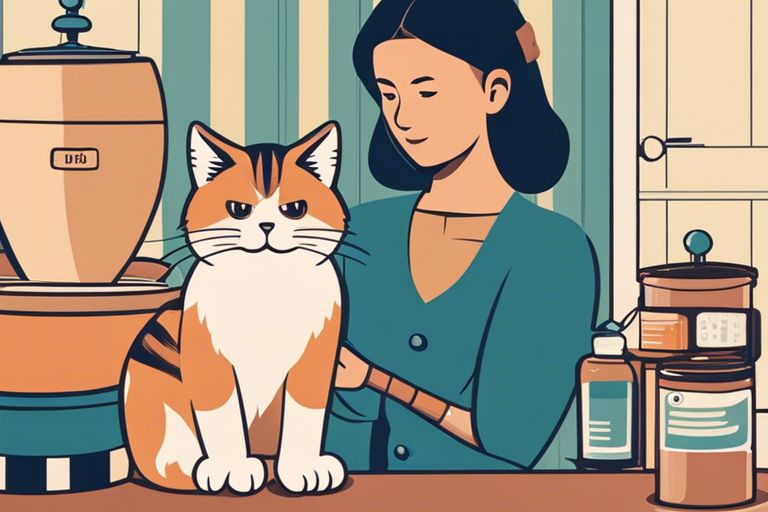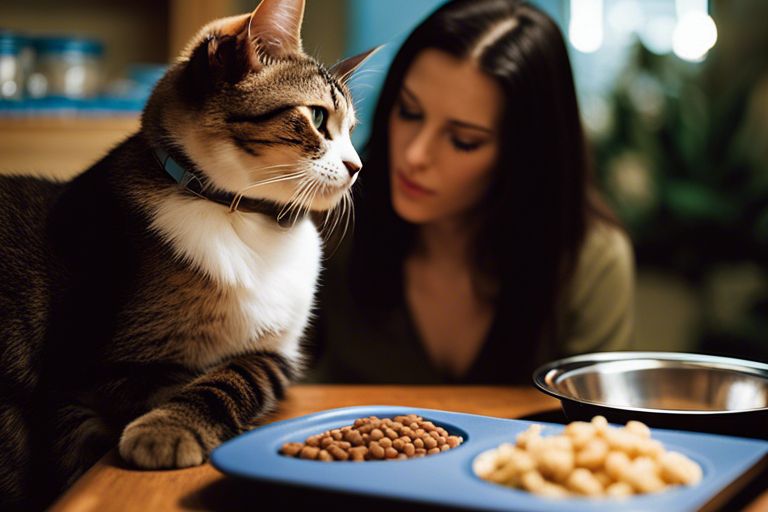Have you ever noticed your feline friend vomiting more often than usual? It can be concerning and even distressing to witness your beloved pet experiencing this issue. While occasional vomiting in cats is normal, frequent vomiting could signal an underlying health problem that requires attention. In this blog post, we will delve into the various reasons why your cat may be vomiting frequently, including potential health issues, diet, and environmental factors. Understanding the possible causes of your cat’s frequent vomiting will help you take appropriate measures to address the issue and ensure your pet’s well-being.
Key Takeaways:
- Dietary Issues: Frequent vomiting in cats can be caused by dietary intolerances, food allergies, or ingesting something toxic or indigestible.
- Hairballs: Cats with long hair or those that groom excessively may vomit frequently due to the presence of hairballs in their stomach.
- Underlying Health Conditions: Chronic illnesses such as kidney disease, hyperthyroidism, or diabetes can lead to frequent vomiting in cats.
- Stress and Anxiety: Cats can vomit as a result of stress or anxiety, especially in multi-cat households or during changes in their environment.
- Seek Veterinary Care: If your cat is vomiting frequently, it is important to consult with a veterinarian to rule out any serious medical issues and determine the best course of treatment.
Understanding Normal vs. Abnormal Vomiting in Cats
Obviously, it can be concerning and distressing when your beloved feline friend vomits frequently. However, it’s important to understand the difference between normal and abnormal vomiting in cats to appropriately address the issue.
Defining Normal Vomiting Behavior
Normal vomiting behavior in cats can occur occasionally and may be attributed to harmless causes such as a quick ingestion of food, hairballs, or mild stomach irritation. It is normal for cats to vomit once in a while, and it does not necessarily indicate a serious health issue. If your cat vomits infrequently, appears healthy, and resumes its normal activities after vomiting, it is likely nothing to worry about.
Identifying Signs of Concern
However, if you notice frequent and repeated vomiting episodes, especially if there are other symptoms such as loss of appetite, lethargy, weight loss, diarrhea, or blood in the vomit, it could be a sign of a more serious underlying health problem. In such cases, it is essential to seek veterinary attention promptly. Your cat may be suffering from a variety of conditions like kidney disease, liver disease, pancreatitis, intestinal obstruction, or other illnesses that require immediate medical attention.
Common Causes of Frequent Vomiting
Some cats vomit frequently due to a variety of reasons. It is important to understand the common causes so you can address the issue and ensure the well-being of your furry friend.
Dietary Issues
One of the most common reasons for frequent vomiting in cats is dietary issues. This could be a result of overeating, consuming spoiled food, or sensitivity to certain ingredients in their diet. If your cat has a sensitive stomach, it is important to feed them a high-quality, nutritionally balanced diet that is easy for them to digest. Avoid sudden changes in their food and always provide fresh, clean water.
Hairballs and Grooming
Another common cause of frequent vomiting in cats is hairballs. When cats groom themselves, they ingest loose hairs that can accumulate in their stomach and form hairballs. Regular grooming and brushing can help reduce the amount of hair your cat ingests and decrease the likelihood of hairballs. Additionally, providing your cat with specialized hairball control cat food can also help prevent the formation of hairballs.
Health Conditions Leading to Vomiting
Now, let’s look at some potential health conditions that could be causing your cat to vomit frequently. It’s important to be aware of these conditions so that you can seek prompt veterinary care if your cat is experiencing any of them.
Intestinal Parasites
Intestinal parasites such as roundworms, hookworms, and tapeworms can cause your cat to vomit. These parasites can be acquired through ingesting contaminated food or water, or through contact with infected animals. If your cat has parasites, you may also notice symptoms such as diarrhea, weight loss, and a dull coat. It’s important to have your cat tested for parasites and treated if necessary to help alleviate their vomiting.
Chronic Diseases and Illnesses
Chronic diseases such as kidney disease, diabetes, and hyperthyroidism can lead to frequent vomiting in cats. These conditions can affect the way your cat’s body processes food and nutrients, leading to digestive disturbances. If you suspect that your cat may have a chronic illness, it’s crucial to seek veterinary care for a proper diagnosis and treatment. Managing these conditions can help improve your cat’s overall health and reduce their vomiting episodes.
By addressing these potential health conditions, you can work towards identifying the underlying cause of your cat’s frequent vomiting and provide the necessary care and treatment. Remember, if you notice any concerning symptoms in your cat, it’s always best to consult with your veterinarian for guidance and support. Your cat’s well-being is a top priority, and addressing their health needs promptly can help ensure that they lead a happy and healthy life.
Diagnosis and Treatment
To diagnose the cause of your cat’s frequent vomiting, you will need to consult a veterinarian. A thorough physical examination and discussion of your cat’s medical history can help the veterinarian determine the underlying cause of the vomiting. In some cases, further diagnostic tests such as blood work, urinalysis, x-rays, ultrasound, or endoscopy may be recommended. For in-depth information on the potential causes and treatment options for frequent vomiting in cats, you can visit Frequent Vomiting in Cats at The Spruce Pets.
When to Consult a Veterinarian
If your cat is vomiting frequently and you notice any other concerning symptoms such as lethargy, lack of appetite, weight loss, or changes in behavior, it’s essential to consult a veterinarian promptly. Remember, frequent vomiting can indicate a serious underlying health issue that requires medical attention. Do not delay seeking professional help if you are worried about your cat’s health.
Possible Diagnostic Tests and Treatments
Upon consulting a veterinarian, they may recommend specific diagnostic tests to identify the cause of your cat’s frequent vomiting. These may include blood tests, imaging studies, or endoscopy to evaluate the gastrointestinal tract. Depending on the underlying cause, treatment options may range from dietary changes and medication to surgery for more serious conditions. Getting an accurate diagnosis is crucial for determining the most effective treatment plan for your cat.
Prevention and Management
After identifying potential reasons for your cat’s frequent vomiting, it’s important to take steps to prevent or minimize future episodes. There are several approaches you can take to manage this issue and improve your cat’s overall health.
Tips for Reducing Vomiting Episodes
If your cat vomits frequently, there are several strategies you can implement to reduce the occurrence of these episodes. Firstly, make sure to feed your cat high-quality food that is appropriate for their age, health, and dietary needs. Using slow-feeder bowls can also help prevent your cat from eating too quickly, which can lead to vomiting. Additionally, ensure your cat has access to fresh water at all times to prevent dehydration. Finally, consider feeding your cat small, frequent meals instead of one or two large meals to reduce the likelihood of vomiting.
- Feed your cat high-quality food
- Use slow-feeder bowls
- Ensure your cat has access to fresh water at all times
- Consider feeding your cat small, frequent meals
After implementing these tips, monitor your cat’s behavior and vomiting frequency to see if there are any improvements.
Importance of Regular Veterinary Care
Regular veterinary care is crucial in managing your cat’s vomiting issues. Your veterinarian can conduct a thorough examination to identify any underlying health conditions that may be contributing to the vomiting episodes. Additionally, they can provide tailored nutritional recommendations and preventive care to ensure your cat’s overall well-being. Remember that early detection and treatment of any potential health issues can significantly impact your cat’s quality of life.

Why does my cat vomit frequently?
Presently, it is important to understand that there can be various reasons why your cat may be vomiting frequently. Some of the common causes include hairballs, dietary issues, and underlying health conditions. It is crucial to monitor your cat’s behavior and consult with a veterinarian to determine the exact cause of the frequent vomiting. Making small changes to your cat’s diet and environment, as well as addressing any potential health issues, can help reduce the frequency of vomiting and improve your cat’s overall well-being. Remember, the health and well-being of your cat is a top priority, so be proactive in seeking a solution to this issue.
FAQ
Q: Why does my cat vomit frequently?
A: There are several potential reasons why your cat may be vomiting frequently. These can include food intolerance or allergies, hairballs, gastrointestinal issues, parasites, or underlying health conditions. It’s important to consult with a veterinarian to determine the cause and develop a treatment plan.
Q: How can I help prevent my cat from vomiting frequently?
A: To help prevent frequent vomiting in your cat, ensure they have a balanced diet that is suitable for their age and health needs. Regular grooming to reduce hairballs, parasite prevention, and keeping toxic plants and substances out of reach are also important. Additionally, providing a stress-free environment and monitoring their behavior for any signs of illness can help prevent vomiting.
Q: When should I be concerned about my cat’s frequent vomiting?
A: If your cat is vomiting frequently, it’s important to monitor their overall health and behavior. If the vomiting is persistent, accompanied by other symptoms such as lethargy, diarrhea, or loss of appetite, or if your cat appears to be in distress or discomfort, it’s crucial to seek veterinary attention promptly. Frequent vomiting can be a sign of a serious underlying health issue that requires professional diagnosis and treatment.

Jayley, a devoted cat enthusiast, also writer for other cat blog as well. She aims to dedicated to providing comprehensive information, insights, and advice on everything you’d ever want to know about our whiskered companions.
